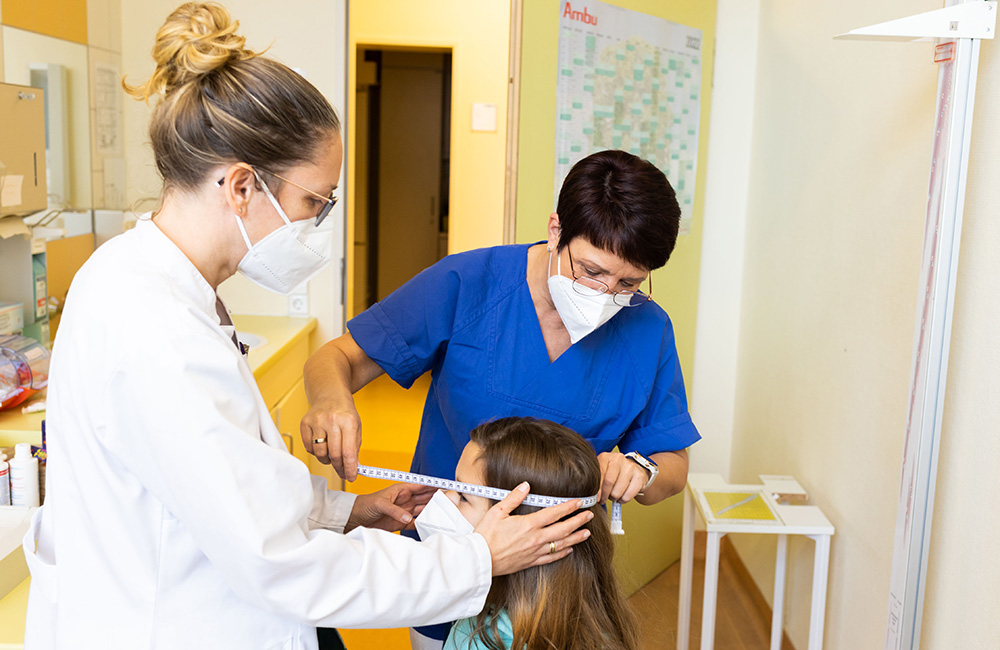Short stature: More than just a few centimeters
Worldwide pivotal study in cooperation with Magdeburg University Children's Hospital demonstrates growth enhancement with early treatment through drug therapy in achondroplasia.
Achondroplasia is a rare disorder in which bone growth is genetically impaired, leading to disproportionate short stature. Worldwide, 250,000 people are affected by this genetic defect. Until now, the height could only be changed by surgery, which is associated with risks. Since 2021, the drug Vosoritid (Voxzogo®, Biomarin International) has been available for the first time as a targeted therapy option for those affected, leading to improved bone growth in 121 achondroplasia patients according to study data. In addition to centers in Australia, the USA and Japan, Magdeburg University Children's Hospital was one of the European study centers. Currently, 24 children and adolescents are being treated at Magdeburg University Children's Hospital. The aim of the long-term observations is to investigate the influence on the disproportions of the body over a longer period of time in addition to the pure body size.

Photo: 9-year-old Alina has been treated with Vosoritid in Magdeburg for a good 11 months and an increase in her growth rate has been observed. In addition, senior physician Dr. Palm (left) and her team record further measurement data every three months, such as head circumference. Photo: Sarah Kossmann/UMMD
Prof. Dr. med. Klaus Mohnike, head of the German Achondroplasty Registry and center director in Magdeburg, explains: "With Vosoritid, a therapy is now available that targets the molecular cause of achondroplasia and can thus offer patients new perspectives. The first 5-year results show a growth gain of 9 centimeters compared to untreated patients."
In achondroplasia, the transformation of cartilage into bone is prevented and bone growth is inhibited. As a result, the upper arms and thighs in particular are shortened. The spine also does not grow evenly in affected individuals, resulting in disproportionate short stature. Affected persons reach an average height of 125 to 130 centimeters. The cause is a pathological change (point mutation) in the gene for the fibroblast growth factor receptor (FGFR-3). This causes permanent activation of the signaling pathway. As a result, the cartilage cells in the growth plate of the bone receive incorrect growth signals.
The everyday life of achondroplasia sufferers is significantly restricted by the dwarfism and is accompanied by numerous sequelae such as a reduced skull base with high-grade narrowing of the occipital hole and spinal cord compression as well as narrowing of the spinal canal with accompanying back and leg pain. The growth disorder of the skull base bones leads to chronic diseases in the ENT area. Obstructive sleep apnea, respiratory insufficiency and increased mortality in the first years of life are also a consequence. "Previous surgical treatment options place a considerable burden on those affected," explains the specialist in pediatrics and adolescent medicine with a focus on endocrinology. Prof. Mohnike has been involved in the detection and treatment of rare growth disorders for more than 40 years and now beyond his retirement, together with senior physician Dr. med. Katja Palm and the team at the Children's Hospital. "Since market approval, the drug has also shown favorable tolerability and efficacy outside of clinical trials. In addition to significant growth in length, we expect to be able to spare some of those affected stressful surgical procedures in the future," says Prof. Dr. Mohnike.
Study Data
In a randomized, double-blind, placebo-controlled 52-week study, 121 achondroplasia patients between 5 and 18 years of age received vosoritide subcutaneously at 15 micrograms per kilogram of body weight daily. Children in the verum group grew an average of 1.57 centimeters more in one year than those in the placebo group. The bones of the spine and extremities grew proportionally. The most common side effects were injection site reactions (85%, 82% for placebo), hypotension (13%), and vomiting. The study was funded by the pharmaceutical company Biomarin International.
Publications
- Savarirayan R, Irving M, Harmatz P, et al. Growth parameters in children with achondroplasia: A 7-year, prospective, multinational, observational study. Genet Med 2022. DOI: 10.1016/j.gim.2022.08.015.
- Savarirayan R, Tofts L, Irving M, et al. Safe and persistent growth-promoting effects of vosoritide in children with achondroplasia: 2-year results from an open-label, phase 3 extension study. Genet Med 2021. DOI: 10.1038/s41436-021- 01287-7.
- Hoover-Fong J, Cheung MS, Fano V, et al. Lifetime impact of achondroplasia: Current evidence and perspectives on the natural history. Bone 2021;146:115872. DOI: 10.1016/j.bone.2021.115872.
- Cormier-Daire V, AlSayed M, Ben-Omran T, et al. The first European consensus on principles of management for achondroplasia. Orphanet J Rare Dis 2021;16(1):333. DOI: 10.1186/s13023-021-01971-6.
- Savarirayan R, et al. Lancet 2020;396(10252):684–692.
- Savarirayan R, et al. N Engl J Med. 2019;381(1):25–35.
- https://clinicaltrials.gov/ct2/show/NCT01603095
- https://clinicaltrials.gov/ct2/show/NCT02724228
- https://clinicaltrials.gov/ct2/show/NCT03583697
- https://clinicaltrials.gov/ct2/show/NCT04554940
- https://clinicaltrials.gov/ct2/show/NCT03197766
- https://clinicaltrials.gov/ct2/show/NCT03424018
Background
Vosoritid (Voxzogo®) ist ein modifiziertes rekombinantes Analogon des C-Typ-natriuretischen Peptids (CNP) und ein positiver Regulator des enchondralen Knochenwachstums. Voxzogo® ist indiziert für die Behandlung von Achondroplasie bei Patienten ab 2 Jahren, deren Epiphysen nicht geschlossen sind. Die Diagnose der Achondroplasie sollte durch entsprechende genetische Tests bestätigt werden.
Produktinformation: https://www.ema.europa.eu/en/documents/product-information/voxzogo-epar-product-information_en.pdf.
Contact
Prof. Dr. med. Klaus Mohnike, Head of the Central German Competence Network for Rare Diseases, E-Mail: , Tel.: 0391/67 24024.
Dr. med. Katja Palm, Pediatric endocrinologist and senior physician at Magdeburg University Children's Hospital, E-Mail: , Tel.: 0391/67 24024.






